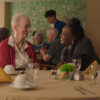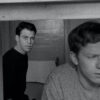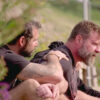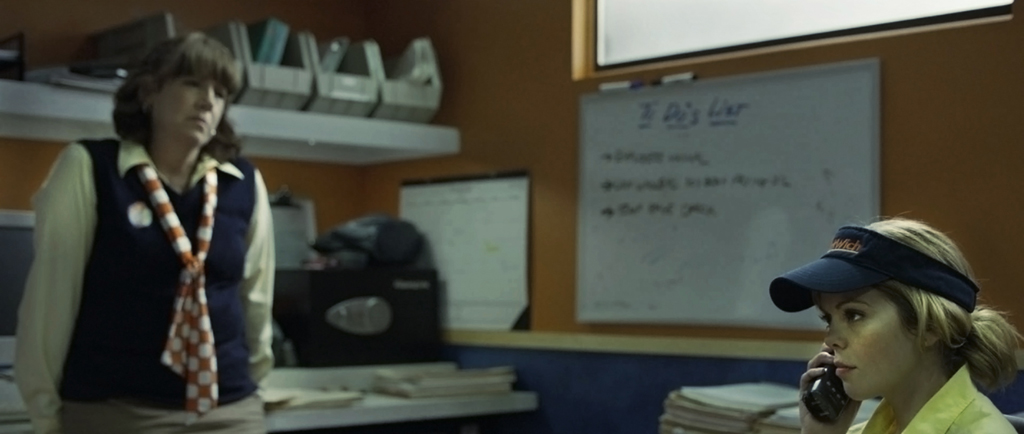For a film that was in part inspired by a series of experiments, it shouldn’t have been entirely unexpected to Craig Zobel that his latest film “Compliance” would become one. Still, Zobel had to have been shaken slightly by some of the reception to the film he made, based on a real life incident of a fast food restaurant employee ordered by her superiors to strip and perform demeaning acts by a suspicious caller claiming to be a police officer. When translated to the screen with an attractive young actress (Dreama Walker) asked to do the same thing, a thriller intended to be tense could suddenly become so for entirely different reasons than the filmmakers meant.
However, in the case of “Compliance,” I found the shivers that ran down my spine as Becky (Walker), the helpless Chick-Wich cashier, finds herself at the mercy of a conflicted manager (Ann Dowd) who’s being strung along by the other end of the line (a frighteningly dispassionate Pat Healy), a result not of any exploitation of the cast onscreen, but of what the film reveals about its audience, some of whom could very well believe they’re above falling prey to such an outrageous situation or are incredulous to the ever-increasing deference to authority in contemporary society.
Perhaps the scariest thing about the film is how assured and precise Zobel is in going about achieving such a conversation starter, aided by a pitch perfect cast, sharp cinematography by Adam Stone and a string-heavy score by Heather McIntosh that punctures. And yet when we sat down with the writer/director at the SXSW Film Festival this past spring, the most intimidating thing about the filmmaker besides his talent is his towering height, otherwise projecting a warm, genial presence one would expect of someone that previously made the charming 2007 comedy “Great World of Sound.” Open to talking about anything related to a film he suspected would be highly divisive, Zobel discusses how he hopes audiences frustrated by the film would extend the same courtesy to him, as well as how integral it was to constantly have discussions with his cast throughout the production and the inspiration of becoming a news junkie.
I’ve been waiting for the next film for a while…
Me too.
How did “Compliance” come about?
I was finishing these other screenplays and it seems like they weren’t going to happen soon and I was fascinated by this. One of the plusses of the time in between “Great World of Sound” and “Compliance” is that I got to write a lot more than I have in my life, so I started getting faster at doing that and [able] to analyze how to do that. In some sense, I was just ready to make one and when I looked at this one, I was like well, of all of them that are out there, that is the most scary, I could fall on my face the worst. It could go wrong in a lot of different ways. And I leave it up to everybody else to see how much I succeed at this or that, but I did feel like that’s the kind of movie you should make fast and on a constrained budget and you should be making things that push you. It felt like the right thing to do and so I wrote the script in September of 2010 and we were shooting it February 2011.
You’ve talked about the Milgram Experiment as an influence, but I picked up on a certain collision of technology and slightly paranoid inevitability that seems uniquely contemporary to where we are now. Was that in your thoughts as you were writing it?
Not in my conscious foreground, but I definitely was feeling that a lot. When I was writing this, and I’ve since stopped doing it, I was in a crazy reading-the-news-all-the-time phase — twice a day, checking all the news blogs, CNN or whatever — [and I was] looking at stuff too much because I realized what started to annoy me about it was that it has to feed itself and I was actually requesting more fuel. [laughs] I was like, give me more of this news.
Although fun isn’t a word that should be used to describe this film, it looks like you might’ve had some with the design of the fast food joint, which in terms of its floor plan actually becomes crucial to how this film plays as a thriller. Was it an interesting challenge?
It was, absolutely. You make a movie like this and you’re hesitant to ever say fun, but that was really, really fun. Matt Munn, the production designer and I talked about it a lot with Adam Stone [the film’s cinematographer] to create the floor plan and to figure out, A, on a real base level, you’re shooting a movie in one room has been done a bunch of times, [and] there’s a visual exhaustion you can get from that in a not good way. That started me and Adam going, “Well, the sun should set so we can light it different” and have the light change and then we’re like, “well, maybe we’ll build it in a way so certain parts in the film, you’re in different parts of the room.” We were really concentrating a lot on trying to make sure we were doing all that stuff, which was fun. And in the bigger floor plan of how the restaurant worked, it was like very fun to go to real fast food restaurants and look at how they operated and like who could hear who and how it worked.
Then the last tip of it [was] just doing the design of what type of restaurant it needed to be. I really wanted it to be a regional fast food chain, like here in Austin, there’s Whataburger, in L.A., there’s In-N-Out Burger. I really didn’t want to do “McDougal’s” or whatever, where it’s obviously a McDonalds I didn’t get the permission. That’s just the boring, lazy way to do it. Like I thought it’d be much more fun to go like, what was one where someone’s like I don’t know? Maybe there really is a thing called the Chick-Wich. [laughs]
The logo is so striking as something that could be real.
Thank you. I designed the logo actually.
You obviously put more care into that than a backwards McDonald’s sign.
Yeah, because it was just kind of fun to see and in pacing a movie, you lose some details sometimes. I’m sad there isn’t more where you can look around and see the ads in the restaurant as much because Matt Munn was very smart about layering the themes of the movie into the way the ads talk to everyone. [laughs] There’s a lot of like, “Your only choice…” and stuff like that in there. But it was just kind of fun to ape a fast food restaurant and just try to get that to where that was believable. That was its own challenge.
You’ve said preparation with actors involved having more conversations than rehearsals and yet this film had to be so precise, so how did that shape what you were doing?
They shaped it to a good degree. The screenplay where it was at when we went into production, I’m not 100 percent sure that a whole lot of lines changed a lot, but we definitely explored different intentions. We’d do multiple takes of things where me and Ann [Dowd] and Dreama [Walker] would be at these things where we were like, “It may need to be a thing where this is the power dynamic” and “It may need to be a thing where this is the power dynamic.” As the shoot went on, because we shot it mostly in order as much as we could, we would drop things, like we’re definitely not doing that anymore.
Since it’s such a touchy subject, did you consult with people about the tone?
What was funny is we did do a lot of screening it for three people or five people and then going like okay, what’s working? What’s tracking? Where are we totally off? Those were immensely valuable for a movie like this, understanding what pace [worked] and [things] people are reading that in a way that I’m not comfortable with. It’s about all these small little things. It did make for a thing that when we showed the film at its premiere for 500 people, I had never seen it with more than five people, so it was a very different experience. [laughs] To me as well as all of them. I was like right there with them, being like whoa, that’s what that feels like to watch that with a bunch of people.
The Sundance premiere became infamous almost instantly after it ended. It’s been interesting as you’ve been doing this – you probably haven’t made anything as divisive. What have you learned about audiences?
A ton. Like I said at the beginning, I was terrified to make this and I went into the movie with the feeling of I’m going to leave myself open to whatever criticism that there is and hopefully be able to learn from the criticism. I’m making decisions about these things and if the criticism is that they’re read in the wrong way, I want to hear it.
The best way to make a movie that [would] fully do justice to what these stories were, you’d need to make a six-hour-long version that could really [take place in] real time and try to be subtle. There are shortcuts in their characterization that I had to make in order to do things, so I recognize what they are and I’m willing to get feedback from that. But people are not willing to give the feedback to me. I’m hearing about it from people that have told me other people and other journalists that liked the film and I’ve heard this critique of it and I’m not hearing that critique directly. Like other people are having these conversations sort of out there, which is its own interesting thing. That’s cool. And it has been a thing that I’m not quite sure I understand.
It’s interesting to hear you talk about taking shortcuts because I actually thought one of the most incredible things about the film are those opening five minutes. Since it has so many ripple effects, did the screenplay actually grow out of that or did you return to that after you had figured out the rest?
The specifics of how I wrote it, I tend to outline a bunch first, so I kind of did. I didn’t feel like it was a movie that you needed to live with [the characters] for 45 minutes before the phone call. It would feel very meandering. As just a writing/filmmaking thing, what’s a way that gets us to like a phone call happening about ten minutes into the movie because like that’s about as much as me as an audience member would like before wait, what is this movie about? [laughs] So I wrote it that way and I tried to set things up.
The delivery truck scene in particular set up the whole movie where the Chick-Wich manager played by Ann Dowd so easily defers to a supplier (Matt Servitto).
And that scene was draft two. I didn’t have that event in the very, very first pass of the script and when I read it, I thought we need to have that in the beginning.
If you made this film in search of answers of why this would happen, did you actually find something satisfactory?
I guess that would be the question I had. I would even say it was much more personal, like I would never do that. But then there was part of me that [thought] that people really would do these things and I think that’s possible [pause] I would be one of those people. Like I don’t know that I wouldn’t do that. I think that I wouldn’t do that, but I would assume everybody would think I would never do that and yet it happened, so at some point, some of those people are wrong in what they think. [laughs] Did I get the answer to that? Not really. Honestly, no. I definitely think I got some answers.
It was a real learning experience to like make it as a movie because I definitely thought about it more than I ever would, which is why I wanted to do it. It’s an unanswerable question. [laughs] I guess I learned that. And it made me think more about people’s relationship with authority figures than I ever thought that it would. I definitely feel like I’ve chewed on gender dynamics and how men use power over women — I definitely thought that was in there, but it’s been interesting to clarify where my head is on that. [I’ve also realized] some movies can be entertainments and be really fun and then there are movies like this and for me, it was incredibly satisfying to do it and get to have more conversations about it.
This isn’t one of the conversations you’re referring to, but after giving Pat Healy such a loveable character in “Great World of Sound,” what was it like to set him up as the kind of villain that people would truly hate him for?
I did talk about that with him. We talked about the whole baby in “Deliverance” thing a little bit, but I kind of feel like the world is different now than that. It’s a complicated character that he plays, so he’s excited to kind of acknowledge that, but he was scared to do it too. We were like hey, this is one of those kind of roles. Are you cool with that? I think people look at actors differently than they did in the late ‘70s or ‘80s where you get typecast as the bad guy because you do it one time. Like “Innkeepers,” the other film he’s in, he’s like really funny, so it’s like…he’s an actor. He’s really good at it.
Was everyone united in being afraid and if so, was it something that strengthened a trust between you?
I think so. What’s interesting is that everybody…that’s kind of why in interviews, I’m like all of the actors and the producers and the DP — all of the people that are involved in the show — there’s some sense of we’re making this thing and we trust that we’re going to achieve and not underachieve. It did unite everybody in a sense. We all had to keep talking about what was fascinating about it all the time. We were all constantly processing the story of the movie, especially with the actors. We would stop and have conversations — the kind of conversations that I’m having with journalists now, we were having on set [laughs] with the lights up and people all around. Part of that was coming out of what you’re saying — everyone feeling united and being a little bit scared. We wanted to make sure that we got something out of it that was close to what we were thinking we should, [though] I’m trying to say not that we got it right.
I’ll say it. That’s why I wanted to ask whether you found an answer because there’s a confidence here.
The closest thing to an answer to the initial question that I have is I’ve come to this understanding that we all have this moral instrument that’s a fractal, delicate thing — it’s like our set of beliefs is very specific. Yours are different than mine. But I don’t think of that set of beliefs at all. It’s just built into the way we are. We shoot it at things and say this is right, that is wrong, this is right, that is wrong. And it’s trickable. You can get a false reading without knowing it. That’s something that I hadn’t really thought about that much in my life, like how do our beliefs work? [laughs] When do you have time to think about that except when you make a weird movie like this?
“Compliance” is now in theaters. A full list of theaters can be found here.




